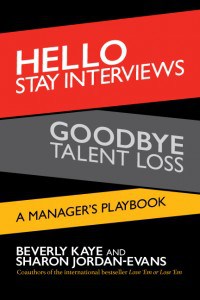Guest Post By Sharon Jordan-Evans and Beverly Kaye
I’m delighted to host this guest post from my co-author, Beverly Kaye, as she and Sharon Jordan-Evans launch their latest book, Hello Stay Interview, Goodbye Talent Loss. With retention of key talent a challenge for most organizations, this book is literally the ‘manager’s playbook’ on how to keep employees engaged… and how to keep them period!
What prevents you from asking your talented people what will keep them engaged and on your team? Are you afraid you will be unable to deliver on their requests? Try using these four steps the next time they ask for something you may not be able to give:
- Acknowledge the requests and restate how much you value your employees.
- Tell the truth about the obstacles you face in granting their requests.
- Care enough to look into their requests and to stand up for them.
- Ask “What else?” — and keep asking. You’ll eventually get something you can work with!
Managers have told us they have other worries, too, and that some of those concerns prevent them from conducting stay interviews. Check out these what ifs. Do any of them feel familiar?
What if You Ask What They Want and They Say, “I Don’t Know”?
Remember that this is not an interrogation . . . it’s a conversation, and hopefully one in an ongoing series of conversations. It’s okay not to know. Some people will be surprised by your questions and need some time to think about it. Let them think, schedule another meeting, and set the stage for an ongoing dialogue about your employees’ wants, needs, and career goals.
What if You Fear Putting Ideas into Employees’ Heads?
Seriously? As if they never thought about leaving on their own?
What if They Question Your Motivation?
Be honest. If you’re not in the habit of having dialogues like these, it could feel strange—for you and perhaps for them. If they smile and ask, “What book have you just read?,” tell them that yes, you did read a book or attend a course, and you did it because they matter to you.
What if It’s Just Not Your Style to Ask?
Banker: [From the audience] If I asked my employees questions like this, they’d fall over in a dead faint. I don’t even say hi in the hallway.
Us: Well—you might want to ease into this, then. Maybe start with hi in the hallway.
What if You Actually Hope They Will Go?
Manager: [At a leadership conference] I have a very poor performer on my team. I’m trying to imagine telling him how important he is to me and to the team—and then asking what will keep him here. It seems disingenuous. How am I supposed to have a stay interview with him?
Us: You definitely need to have a chat with him—but it’s a performance chat, not a stay interview.
Us: [Qualifying a bit] On the other hand, maybe he’s not performing because you’ve never held a stay interview with him. Might he perform better in a different role, with different tasks or teammates—or with a different boss?
What if Cultural Differences Make You Nervous about Asking?
How do cultural differences play out in this crucial, foundational engagement strategy—the stay interview? We asked colleagues and clients around the globe, and the majority said that it works just as well in their regions as in the United States. However, asking questions may not always be encouraged, especially in more hierarchical cultures.
If you manage others in a culture where asking is not accepted or recommended, you’ll need to find a work-around. Some managers have used anonymous surveys or tasked someone else with the “asking.” However you seek to learn about what your talented employees really want, it is crucial that you do gain that information.
What if They Are Younger (Older), Introverted (Extroverted), or Smarter than You?
This is about all those other differences we worry about. Stop worrying and start exploring the preferences and unique characteristics of each of your treasured people. Get to know them better and customize your approach to each individual.
What if It Really Is All about the Money?
If employees see compensation as noncompetitive, unfair, or simply insufficient to sustain life, their dissatisfaction levels will go up. They will become vulnerable to talent theft or will begin looking around for something better, especially in a favorable job market. But here’s the rub: although inadequate pay can be a huge source of dissatisfaction, even fair pay won’t retain people who are unhappy in other key areas. If your talented people do not feel challenged or developed or cared about, a big paycheck will not keep them for long.
It is true that some people are motivated primarily by money. If that’s the case, you might honestly have trouble hanging on to some of them. One senior leader said he’d learned that it is pointless to try to hang on to talent with money alone, because there is always a higher bidder. Pay fairly and competitively and then focus on the stay factors you can influence.
Some managers have said they lost sleep over holding stay interviews with their talented people. Then they did it; they held the conversation and it worked out great. Their employees thanked them for taking the time and caring enough to ask what would keep them engaged and on the team.
*Content adapted from Beverly and Sharon’s new book, Hello Stay Interviews, Goodbye Talent Loss, Berrett-Koehler, 2015.
BEVERLY KAYE is the founder of Career Systems International (www.CareerSystemsIntl.com), a global leader in delivering innovative talent management solutions. SHARON JORDAN-EVANS (sharon@jeg.org) is a sought-after executive coach and popular keynote speaker for Fortune 500 companies. They are the authors of five editions of Love ’Em or Lose ’Em, as well as Love It, Don’t Leave It.


